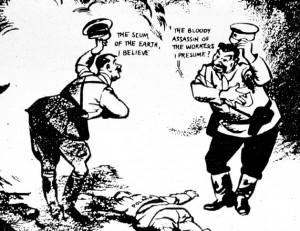Palm Oil, Child labor, Evil, and Deliberate Decisions
This story breaks my heart and makes me angry.
Child labor in palm oil industry tied to Girl Scout cookies
10-year-old Ima helped harvest the fruit that makes its way into a dizzying array of products sold by leading Western food and cosmetics brands.
Ima is among the estimated tens of thousands of children working alongside their parents in Indonesia and Malaysia, which supply 85% of the world’s most consumed vegetable oil. An Associated Press investigation found most earn little or no pay and are routinely exposed to toxic chemicals and other dangerous conditions. Some never go to school or learn to read and write. Others are smuggled across borders and left vulnerable to trafficking or sexual abuse. Many live in limbo with no citizenship and fear being swept up in police raids and thrown into detention.
The AP used U.S. Customs records and the most recently published data from producers, traders and buyers to trace the fruits of their labor from the processing mills where palm kernels were crushed to the supply chains of many popular kids’ cereals, candies and ice creams sold by Nestle, Unilever, Kellogg’s, PepsiCo and many other leading food companies, including Ferrero – one of the two makers of Girl Scout cookies.
… Ima led her class in math and dreamed of becoming a doctor. Then one day her father made her quit school because he needed help meeting the high company targets on the palm oil plantation where she was born. Instead of attending fourth grade, she squatted in the unrelenting heat, snatching up the loose kernels littering the ground and knowing if she missed even one, her family’s pay would be cut.
She sometimes worked 12 hours a day, wearing only flip flops and no gloves, crying when the fruit’s razor-sharp spikes bloodied her hands or when scorpions stung her fingers. The loads she carried, sometimes so heavy she would lose her footing, went to one of the very mills feeding into the supply chain of Olivia’s cookies.
“I am dreaming one day I can go back to school,” she told the AP, tears rolling down her cheeks.
Child labor has long been a dark stain on the $65 billion global palm oil industry. Though often denied or minimized as kids simply helping their families on weekends or after school, it has been identified as a problem by rights groups, the United Nations and the U.S. government.
Let’s look closer at what’s going on. Above the story says that Ima’s father made “her quit school because he needed help meeting the high company targets”. The same thing is mentioned again, later in the article.
Indonesia is the world’s largest palm oil producer and, with a population of 270 million, there is no shortage of strong backs. Many laborers migrate from the poorest corners of the country to take jobs that others shun, often bringing their wives and children as helpers in order to meet impossibly high daily quotas.
The company executives who set those high daily quotas, will wash their hands of the child labor saying that “it’s the parents choice to bring their children to the fields” and “we can’t stop that”. Of course, they could. Lower the daily quotas to a level that one person can meet on their own. Keeping the daily quotas high isn’t about preventing laziness or motivating hard work or incentivizing creative ways to increase efficiency. It’s about forcing people into impossible choices, all for the good of your own bottom line. It is, in short, greedy and evil.
I wonder if the Bible has anything to say about giving people high daily quotas.
So the Egyptians made the Israelites their slaves. They appointed brutal slave drivers over them, hoping to wear them down with crushing labor. They forced them to build the cities of Pithom and Rameses as supply centers for the king. But the more the Egyptians oppressed them, the more the Israelites multiplied and spread, and the more alarmed the Egyptians became. So the Egyptians worked the people of Israel without mercy. They made their lives bitter, forcing them to mix mortar and make bricks and do all the work in the fields. They were ruthless in all their demands.
… But Aaron and Moses persisted. “The God of the Hebrews has met with us,” they declared. “So let us take a three-day journey into the wilderness so we can offer sacrifices to the Lord our God. If we don’t, he will kill us with a plague or with the sword.”
Pharaoh replied, “Moses and Aaron, why are you distracting the people from their tasks? Get back to work! Look, there are many of your people in the land, and you are stopping them from their work.”
That same day Pharaoh sent this order to the Egyptian slave drivers and the Israelite foremen: “Do not supply any more straw for making bricks. Make the people get it themselves! But still require them to make the same number of bricks as before. Don’t reduce the quota. They are lazy. That’s why they are crying out, ‘Let us go and offer sacrifices to our God.’ Load them down with more work. Make them sweat! That will teach them to listen to lies!”
These workers end up in a repeating cycle of poverty, because they’re kept out of school as children.
But the biggest obstacles faced by Alex and other child workers in the two countries are lack of access to adequate, affordable education and medical care.
Some companies in Indonesia provide rudimentary elementary schooling on plantations, but children who want to continue their studies may find they have to travel too far on poor roads or that they can’t afford it. In Malaysia, the problem is even bigger: Without legal documents, tens of thousands of kids are not allowed to go to government schools at all.
It’s such an extensive problem that Indonesia has set up learning centers to help some of its children on plantations in the neighboring country, even sending in its own teachers. But with such heavy workloads on plantations, one instructor said he had to beg parents to let their sons and daughters come for even just a half-day of classes. And many children, especially those living in remote, hard-to-reach areas, still have no access to any type of education.
“Why aren’t companies playing a role in setting up schools in collaboration with the government?” asked Glorene Das, executive director of Tenaganita, a Malaysian nonprofit group concentrating on migrant issues for more than two decades. “Why are they encouraging the children to work instead?”
And, yes, I use “kept out of school” deliberately. When children are prevented from going to school because they don’t have legal documents, presumably because no one will give them legal documents, someone is making a choice to deny them that which they need to get an education. And when companies are happy to pretend that they don’t see child labor even as they avoid setting up schools for the children that they know are on their plantations—well, that’s a choice too.
Are the companies which are buying and using palm oil acting responsibily?
The [Girl Scout cookies] bakers’ parent companies – Italian confectionary brand Ferrero and Canadian-based Weston Foods – would not comment on the issue of child labor, but both said they were committed to sourcing only certified sustainable palm oil.
Weston Foods, which owns ABC Bakers, would not provide any information about its palm oil suppliers, citing proprietary reasons, so the AP could not determine if its supply chain was tainted.
“Proprietary reasons”. I’m going to make my own decision. Weston Foods is guilty of using palm oil made by child laborers. That’s the most plausible explanation for why they won’t tell AP who their suppliers are.
Weston Foods is owned by George Weston Limited. It, in turn, is owned by the Canadian branch of the Weston Family. Galen G. Weston is the current chairman and CEO of George Weston Limited.
He sounds like a man who places profits far above people.
Weston has faced frequent criticism from the Canadian labour movement, including from unions representing his companies' workers and from organizations promoting workers' rights and poverty reduction more generally. On December 31, 2017 Galen Weston Jr. "won" labour organization RankandFile.ca's 2017 Scumbag of the Year award. The organization holds Weston responsible for opposing a $15 minimum wage, engaging in tax avoidance via offshore holdings, firing 500 workers and closing 22 stores in response to an increase in minimum wage, and being caught in a 14 year bread price fixing scam.
In June 2020, Weston confirmed the cancellation of an hourly $2.00 CAD wage premium to Loblaw workers, earning criticism from Unifor President Jerry Dias. The premium was paid to low-wage grocery store workers, who were deemed "essential" and required to attend work in dangerous conditions while most of Canada was shut down in response to the Covid-19 pandemic.
Why do I bring all of this up? Because evil is perpetuated by real people, specific people, who make specific decisions that make the world a worse place. And I may not be able to do much to change a man like Galen Weston, prick his conscience, or cause him discomfort. But I can do my tiny part to tell the truth.
Galen Weston runs a company that knowingly purchases palm oil that is produced with child labor. Galen Weston has the power, authority, and clout to make a real difference in the fight to stamp out child labor, to stamp out child illiteracy, to make the world a better place. And he chooses not to do it. He is not a good man.
Likewise, Girl Scouts of America chooses to contract with ABC Bakers, owned by Weston Foods, to make their Girl Scout cookies. They could make a different choice. So far they have chosen not to. They also share the blame for the child labor in Indonesia and Malaysia.
If you’ve read this far down, you now have a choice to make. Will you continue purchasing Girl Scout cookies? Or will you do your tiny part to make the world a better place?
This entry was tagged. Children Ethics Foods Incentives Morality Poverty Profit Motive Responsibility






